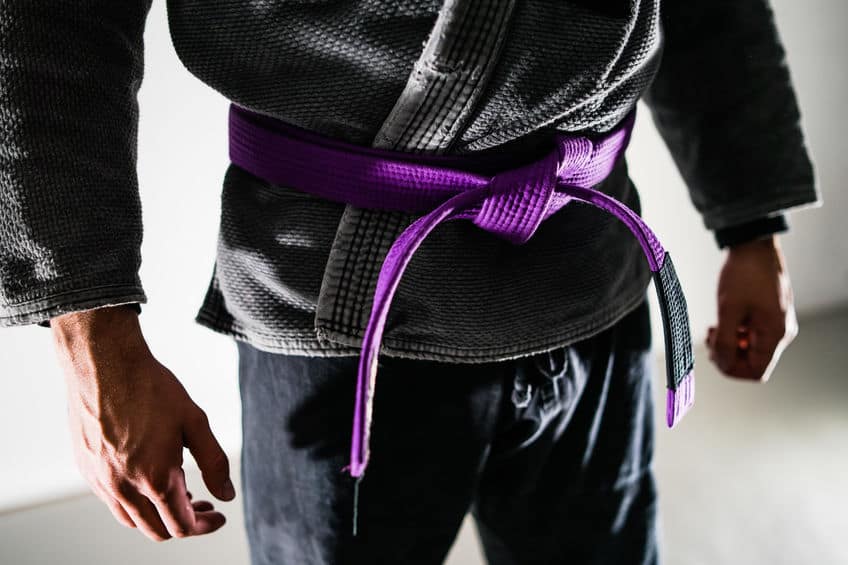
When it comes to belt rankings in various martial arts they are not all considered equal For example, it takes just as long to get a purple belt in BJJ as it does to get a black belt in many other martial arts. This might make you wonder how good a BJJ purple belt is.
BJJ purple belts are very good grapplers and likely have at least 5 years of training experience in their craft. The purple belt would be the first belt in BJJ that would be considered an advanced belt.
Someone who was new to BJJ would not stand a chance against a purple belt. That is unless there was a very massive difference in size. But someone who has trained long enough to get a purple belt is good enough at BJJ to handle an opponent much larger and more athletic than themselves.
So do not underestimate just how good a jiu-jitsu purple belt might be. In fact, some of the best professional grapplers in the world are purple belts. This is also the belt level that might even start to help teach classes but usually with the supervision of their professor.
How Long Does It Take To Get To Purple Belt?
You can expect to train consistently for 4-6 years before getting your purple belt in BJJ. Of course, many people have achieved purple belt at a faster rate but it also takes some people much longer than this. In fact, I know people who took over 10 years to get to purple belt.
How fast someone gets their purple belt really depends on their natural ability, dedication, and expectations of their professor.
Purple belt comes directly after the blue belt and right before the brown belt in BJJ. When someone gets to their purple belt they are no longer considered a novice.
So yes a purple belt is very good at BJJ. After all, what else would expect after training BJJ for 5 years or longer? You would at least hope that you were pretty good at jiu-jitsu by that point.
As a comparison, it takes about the same amount of time to get a judo black belt as it does to get a BJJ purple belt. It takes typically even less time than this to get a black belt in taekwondo.
I do not say this to diminish the other arts. Instead, I am simply saying that not all martial arts belt programs or on the same progressive timeline as others.
How Hard Is It To Get To Purple Belt?
Getting a purple belt in BJJ is not an easy task. In fact, I would guess that less than 10% of white belts actually make it to the purple belt level. The main reason so few people make it to the purple belt is simply the time and dedication it takes to reach this level.
As mentioned, it takes some people over 6 years to reach purple belt in BJJ. Keep in mind it takes 4-6 years on average when the person is training constantly and multiple times per week.
We are not talking about someone who trains for a while, takes a few months off, and comes back. Instead, we are talking about someone dedicated to learning. For comparison, it’s about the same amount of time it takes to get a master’s degree.
It is easy to watch MMA on the couch and decide that you want to learn some submissions. But like with most things, many people do not want to put in the time to actually get good at a certain skill.
How Good Is A BJJ Purple Belt In A Street Fight?
How good a BJJ purple belt is in a street fight depends on many factors. That said, most BJJ purple belts should have a huge advantage over an opponent in a street fight.
The only unfortunate thing is that many BJJ schools do not train for self-defense like they used to. Some places such as the Gracie Jiu-Jitsu schools still expect students to learn how to use BJJ for self-defense or in the street.
A BJJ purple belt who understands self-defense should be very good in a street fight, especially in a one-on-one situation. A purple belt in a street fight against someone should easily be able to take down their opponent and either hold them down or choke them out.
Of course, many BJJ schools have moved towards only teaching sport BJJ and never practice using BJJ in a real-life situation. That said, even a purple belt who has only trained for sport should be good in a street fight.
After all, professional boxers don’t train for street fights but you still probably don’t want to pick a fight with one. In the same way, many BJJ players don’t train for street fights but are still very dangerous.
That said, I still think you should understand how to use your BJJ in a real-life situation even if you are more into the sport of BJJ. Either way, a BJJ purple belt is dangerous in a street fight.
How Good Is A Purple Belt In MMA?
A purple belt in MMA is actually much better than you might think. When you have to spend so much time perfecting your overall game, a purple belt is likely plenty good for MMA.
Of course, I am not saying to stop training BJJ for MMA after a purple belt. But a BJJ purple belt who is also a good wrestler and striker has all the skills to be a pro.
In fact, there are many MMA fighters who have won a UFC belt at the white belt level of BJJ. Obviously, they had skills in other areas such as wrestling or Muay Thai but still.
In addition, I would advise at least getting to the purple belt level if you want to be a pro-MMA fighter but just keep in mind that you are going to need to spend a lot of time working on all areas of MMA.
In many ways, a BJJ purple belt understands all the basics of jiu-jitsu. The difference oftentimes between a BJJ purple belt and a black belt is that the black belt has simply mastered these same techniques at a higher level.
Really having a certain belt in BJJ goes further than whether or not you can execute the technique but rather if you understand it well enough to teach others in detail.
